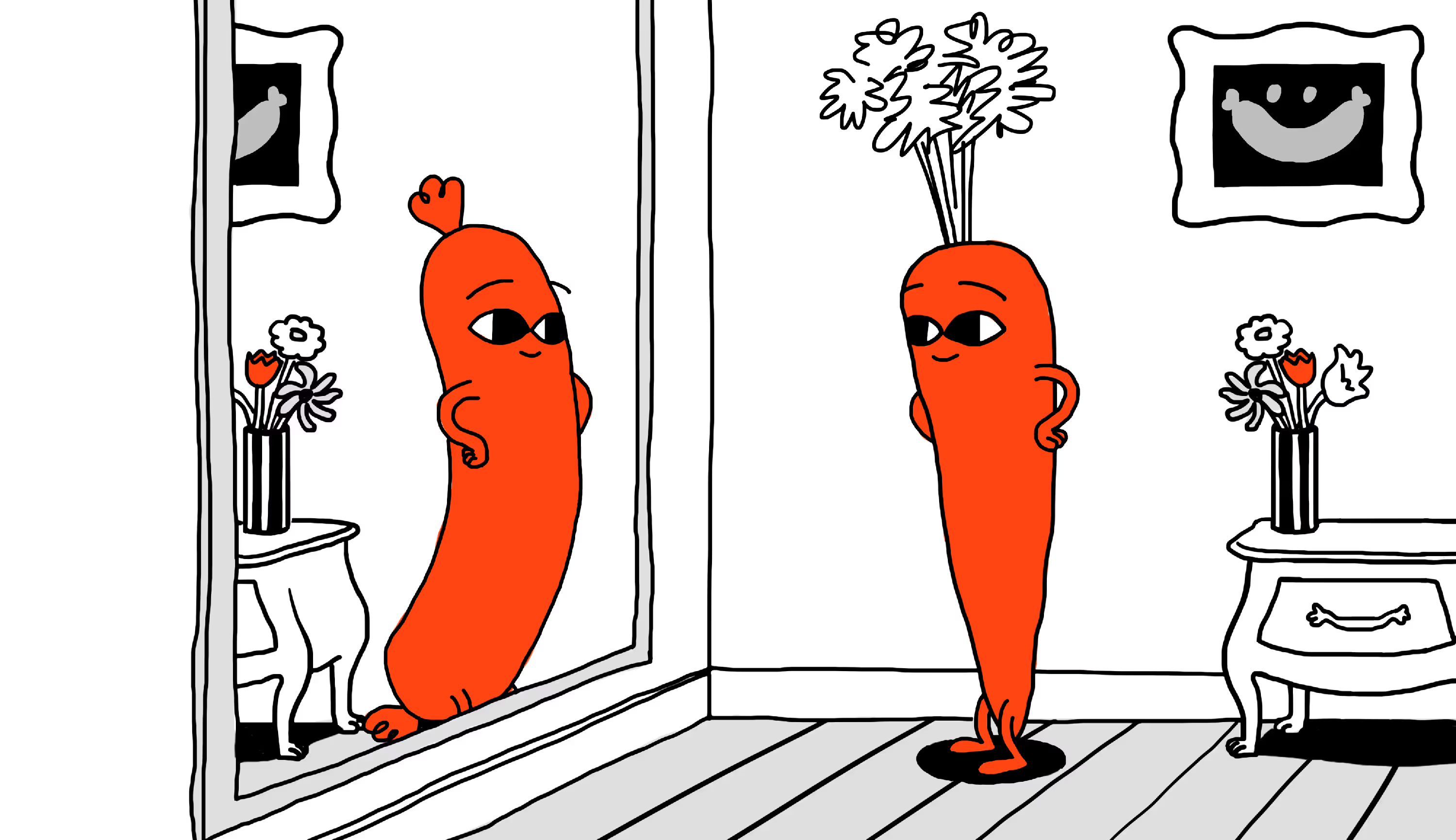As a devoted herbivore, barbecues really suck.
It’s impossible to go unnoticed; as soon as someone spots your tofu kebabs, you’re fucked.
Suddenly, unwanted talks about climate change ensue. And for some reason, you’re now the living visage of WebMD, and everyone’s grilling you about bioavailability, protein, and B12. But, you must play along, because, well, you made your bed of lettuce, and now you must lie in it.
To avoid this, I've found it best to bring a veggie option so similar to real meat I don’t run the risk of insulting the grill master or being accused of meat-shaming.
Still, it never takes long for someone to turn up their nose and say, "Well, if you're gonna eat THAT, why not eat REAL MEAT? That stuff is so processed!"
And while these comments are frustrating, I’m forced to consider...Are they right?
Are plant-based meats unhealthy just because they’re processed? Are processed foods really so dangerous?
Why is it better to eat what was once literally a cow’s ass than a crushed-up soybean, beautifully disguised as that cow’s ass?
If only someone came along to demystify this terrible quandary, so humanity could move on to new debates, and barbecues everywhere could leave their token vegans in peace…
Allow me.
What are processed foods?
If you've listened to the news in the last twenty years, you'll know that processed foods:
- single-handedly toppled the Roman Empire
- danced upon the ashes of the Library of Alexandria
- and, most likely, faked the moon-landing with Stanley Kubrick.
Basically, these are bad hombres. And you want to stay away from them...
The reality is most of what we eat is processed. According to the International Food Information Council, any food that's deliberately changed before it is ready for us to eat is, technically, processed.
Take, for example, all these “processed” foods:
- Canned beans
- Frozen fruit
- Bread
- Bagged spinach
- Kale chips
Of course, most doctors would have a hard time steering you away from canned chickpeas due to their "processed" nature. And most wouldn’t try to. What they really want you to avoid are the so-called "ultra-processed" foods, which include:
- Potato chips
- Refined white bread and pasta
- Candies
- Processed meats, like Slim-Jims and cold cuts.
Yet, much of the media buzz still conflates canned beans and ultra-processed foods; Slim-Jims and plant-based meats. And we're led to believe anything labeled "processed" is therefore unhealthy.
So, why are processed foods bad for me?
Ultra-processed foods are stripped of essential nutrients and fiber our bodies love, and at the same time, packed with the refined sugars, harmful fats, and copious salts our bodies hate. Their lack of fiber and addictive flavor make them easy to eat without ever feeling full, so we eat them to excess.
This is borne out by the fact that highly processed foods contribute 58% of calories and 90% of added sugar in the American Diet. It's also estimated only 5% of Americans meet the recommended daily intake of fiber (25g for women, 38g for men (. This is concerning, considering adequate fiber intake is associated with better G.I. health and reduced risk of:
- heart attacks
- strokes
- high cholesterol
- obesity
- type-2 diabetes
- and even some cancers.
The TL;DR here is this: eating too many ultra-processed foods fills you up with empty calories, crowds out fiber and nutrient-rich foods you should be eating, while adding a lot of hidden salt, sugar, and fat to your diet. Too much of these lead to things like high blood-pressure, heart disease, and obesity.
So, processed foods in and of themselves aren’t bad. But letting them dominate your diet is. And you should choose which ones you eat with care.
Can I eat processed foods and be healthy?
This is not a nutrition publication. But, knowing what we know now, common sense would say that as long we eat enough of the good stuff (essential micronutrients and fiber) and minimize the bad stuff (saturated/trans-fats, sugars, and large quantities of salt), we're probably in the clear.
All we have to do is eat a variety of whole or minimally processed foods while saving ultra-processed foods as a special treat.
Applying this to plant-based meat, it’s beginning to look like they can actually fit into a healthy diet, so long as we meet our nutrient and fiber needs.
And while I’m quite satisfied with that information, I can already hear cries of protest echoing from the digital rafters. And they demand to know...
Isn’t meat a whole food, and therefore better?
Well, not exactly...
In the United States, 25% of meat consumed is processed, meaning it is smoked, cured, or otherwise manipulated before consumption . The WHO classifies processed meat as a carcinogen, deeming it as cancer-causing as cigarettes . It estimates with every 50g portion of processed meat eaten daily (about 1-2 slices of sandwich meat, or a thick slice of bacon), the risk of colorectal cancer goes up about 18% .
This is no small problem. A recent study by the Global Burden of Disease Project found that about 34,000 deaths per year worldwide are attributable to diets high in processed meats .
Still, this won’t satisfy everyone. After all, you may limit processed meat and get plenty of nutrient-dense, fiber-rich foods.
Which brings us to our original question: If the alternative to unprocessed meat is processed plant-meat, why make the switch?
I'd like to pose a radical idea. It may chafe a little at first, but bear with me…
Maybe we’ve been asking the wrong question. Maybe it’s our definition of “meat” that’s flawed. Not whether it’s processed.
Because maybe all meat is processed, and plant-based meat just goes through fewer steps before reaching your tastebuds?
Well, if that were true, could we justify eating animal meat at all?
The secret life of meat
If there’s anything to be said about the meat industry, it’s that they’re fantastic storytellers.
Somehow, despite mountains of secret camera footage and decades of animal activism, most of us believed the happy cows and green pastures on our food labels were real.
This myth is the main reason people shy away from plant-based alternatives, thinking they’re somehow less natural than animal foods.
But the truth is, with 99% of meat coming from factory farms , the vast majority of animals being raised for food today are more similar to machines than wildlife. They are “instruments” used by humans to turn plant matter into animal flesh. They are processors—and terribly inefficient ones at that.
The Process
Take the example of a typical beef cow. We'll call her Sally.
After weaning for 3-7 months, Sally goes to a feedlot where she's crowded in with sometimes thousands of other cows. There she’s fed a diet of 70-90% corn and other grains, like soy, as well as protein concentrate.
This grain-heavy diet wreaks havoc on her digestive system. Coupled with easy transmission of bacteria in the feedlot, this method requires daily rations of antibiotics. These will make her grow much faster than she would in nature, and about 6 months later, she's sent to be slaughtered, processed, shrink-wrapped, and shipped off to the grocery store.
There’s not much natural about this system. In fact, one could argue removing the processing unit—the animal—from the equation amounts to less processing under current circumstances.
All told, only 2% of the calories Sally ate as feed were converted to the same number of calories of beef . We could have fed all that grain directly to humans, but chose to turn 98% of it into cow poo and unusable organic matter (i.e. the rest of Sally). All because we can’t imagine not using a cow to turn plants into meat.
In the past, this was our only option. But current technology allows us to employ people to assemble those grains, proteins, and fats into delicious plant-based alternatives, all of which produce far less waste and far more benefits to human and animal welfare.
So, you see, all meat is processed by someone. Sometimes that someone is an animal. But now, it doesn’t have to be.
The last barbecue
Meat is tasty, convenient, and a large part of many social traditions. But, as we can see, it’s a weird way of getting our protein.
So, what if we accepted a new definition of meat?
What if "meat" no longer meant processing nutritious plants through an animal, only to harvest a tiny sliver of those calories for food? What if we accepted that all meat comes from plants? And plant-based meat just skips the cow?
Actually, some very smart people already crunched the numbers for us.
A recent Oxford study found that a plant-based diet can reduce our personal carbon footprint by 73%, reduce our need for farmland by 75%, and cut agricultural emissions by 60% .
They went as far as to call it “the single biggest way to reduce our environmental impact.” Better than raising crop yields. Better than tackling food waste .
This might be bumming you out. But I find it amazing.
It means you can make massive carbon reductions through everyday habit change. You can create more farmland to feed the growing population. You can slow climate change.
And you can still enjoy a juicy burger with your friends when you want to. I’d call that a pretty sweet deal.
I, for one, hope to put the old-school definition of meat behind us. And our blanket hatred of food processing. Then maybe, someday in the future, we can all stand around the grill, soy-burgers in hand, and say, “Damn, these totally saved our asses. Thank God for processed food!”






